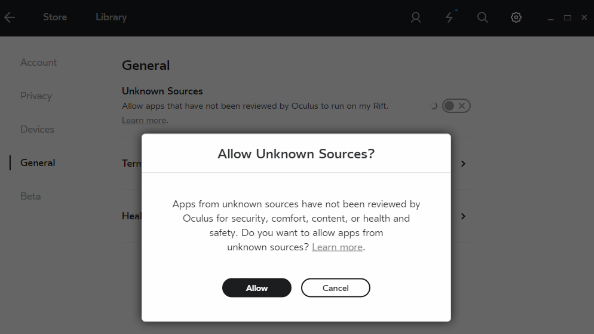As with Apple’s storefront and Google Play, Oculus has its own online marketplace by which it distributes content for the Rift. You can access content that isn’t distributed via the Oculus store too, but in order to do so you’ll need to opt in, ticking a warning pop-up that advises that the content has not been reviewed by Oculus for “security, health, comfort, health, and safety.”
Looking for the finest experiences your Rift has to offer, tickboxes be damned? Check out the best VR games around.
It’s hardly an unprecedented distribution model in today’s tech industry, but not everyone received the news in a recent blog post from Oculus positively. Epic’s Tim Sweeney, who recently spoke out against Microsoft’s Universal Windows Platform, accuses Oculus of relegating rival distribution platforms and third-party content to the sidelines:
Very disappointing. @Oculus is treating games from sources like Steam and Epic Games as second-class citizens. https://t.co/8rFhkECXnR
— Tim Sweeney (@TimSweeneyEpic) 28 March 2016
Sweeney has also taken Oculus studio head Jason Rubin to task over his announcement that Oculus was an “open platform.” The Epic co-founder points out that developers have to request keys for Oculus DRM. And, er, gets quite visual:
Open pic.twitter.com/N8QxmknKK4
— Tim Sweeney (@TimSweeneyEpic) 28 March 2016
Here’s what Oculus have to say about how the store works, and how to access content outside their store:
“The Oculus platform and store are designed to provide the best VR experience and content, but we also recognize that people will want to use apps that aren’t available on the Oculus platform or in the store.
As a developer, you don’t have to be in the Oculus Store — you can sell outside, and when you do that you can you use your own IAP if you prefer, and we don’t take a cut. You can also request keys (royalty free) to sell your Oculus PC app on other stores, while making it available to the community through the Oculus platform.”
As Polygon point out, that means that it’s possible to consolidate your content via the Oculus store even if it isn’t being hosted there primarily: “If you buy a game on Steam, that developer can request keys to provide along with it so you can launch the game from within the Oculus home screen… This allows developers to sell directly to players, or through platforms like Steam, while Oculus still gives you the option of using its menus and organization to keep all your VR apps in one place.”
That all sounds reasonable – but it’s worth pointing out that it in order to let in apps not supported by the store, users will need to open the desktop app and explicitly allow them. By default, it appears, apps coming from outside the store aren’t allowed.

It’s a bizarre situation – Oculus proudly announcing that they’re an open platform, while simultaneously taking flak for accusations to the contrary. The impact of their store’s inner workings will only become clear over time, but it’s clear that at least one major studio feels alienated by it.
Thanks, PC Gamer.
Is Oculus an open platform or not? Have your say in the comments below.
